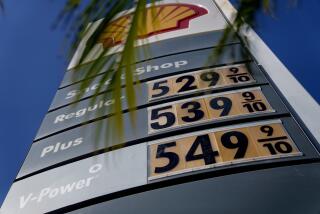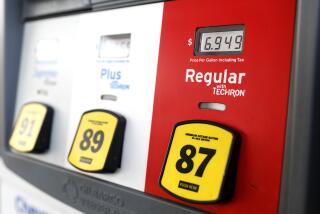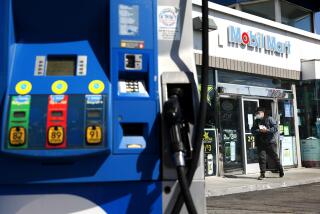A group’s opposition to a possible gas tax increase gets no traction
With gasoline prices dropping in California, a business coalition may have a tough time winning public support for a campaign to delay the next phase of a state program to combat climate change.
They’re opposed to regulations taking effect Jan. 1 to curb pollution from oil refiners that could raise gas prices at least 15 cents a gallon. But oil industry analysts question whether the public will notice.
Over the summer, the group California Drivers Alliance — which is backed by the oil, agriculture, retail, tourism and other industries — has run radio, online and print ads to warn the state’s almost 25 million motorists that they could be hit with a “hidden gas tax.”
The expensive public relations effort struck out in the Legislature last month when a coalition-sponsored bill failed to get a hearing. And it appears to be doing no better with Gov. Jerry Brown.
“We have no plans to change the program at this time,” said Dave Clegern, a spokesman for the Air Resources Board.
Both oil companies and anti-global-warming activists expect refiners to pass along to consumers the cost of paying for credits allowing them to release greenhouse gases.
The alliance says it has collected 80,000 signatures on an Internet petition from people worried about the increase. They want regulators to do a thorough analysis of the effect.
Last week the alliance released an economic analysis it commissioned that suggested that the higher gas prices could eliminate 18,000 to 66,000 jobs in its first year.
State officials dispute that finding. And experts who track retail and wholesale gas prices are skeptical.
Drivers probably won’t notice the global-warming-related increase because average gas prices are the lowest they’ve been since fall 2010, said Tom Kloza, chief oil analyst for GasBuddy.com. What’s more, he said, average prices in Los Angeles, which were at $3.76 per gallon of regular last week, are expected to fall an additional 15 to 20 cents in the next 100 days.
The so-called hidden gas tax, Kloza said, “doesn’t seem so apocalyptic to a public that was paying $4 or $4.20.”
More regulations?
Oil companies aren’t the only businesses upset with California environmental regulations. Fishing enthusiasts and the companies that equip them are incensed over a possible ban on some gear, especially lead sinkers, used to weigh down baited hooks so they drop to a level where fish are feeding.
Lead has been identified by scientists as a carcinogen and reproductive toxin.
This month, the Department of Toxic Substances Control put sinkers and other fishing paraphernalia on a list of priority products to be reviewed as possible threats to human health, the environment or wildlife. The California Sportfishing League opposes the proposed ban, warning of a potential 10-fold increase in the cost of complying with new rules.
“When fishing is no longer an accessible and affordable source of recreation for millions of anglers,” said league President David Dickerson, “it will have a substantial impact on California’s economy and jobs.”
Twitter: @MarcLifsher







